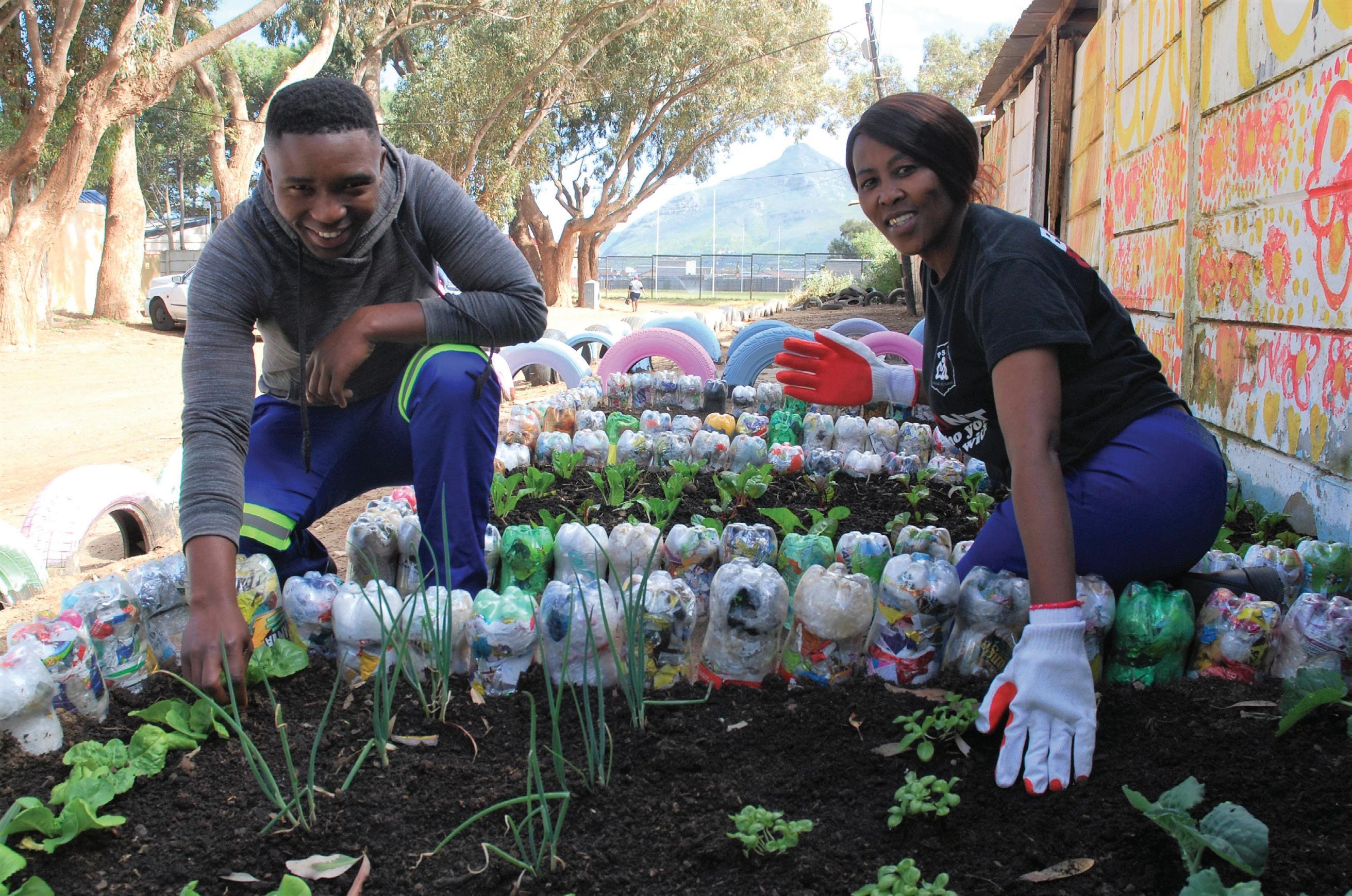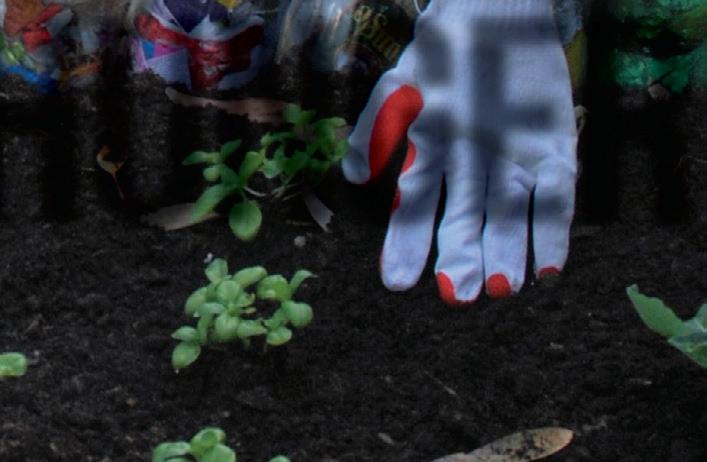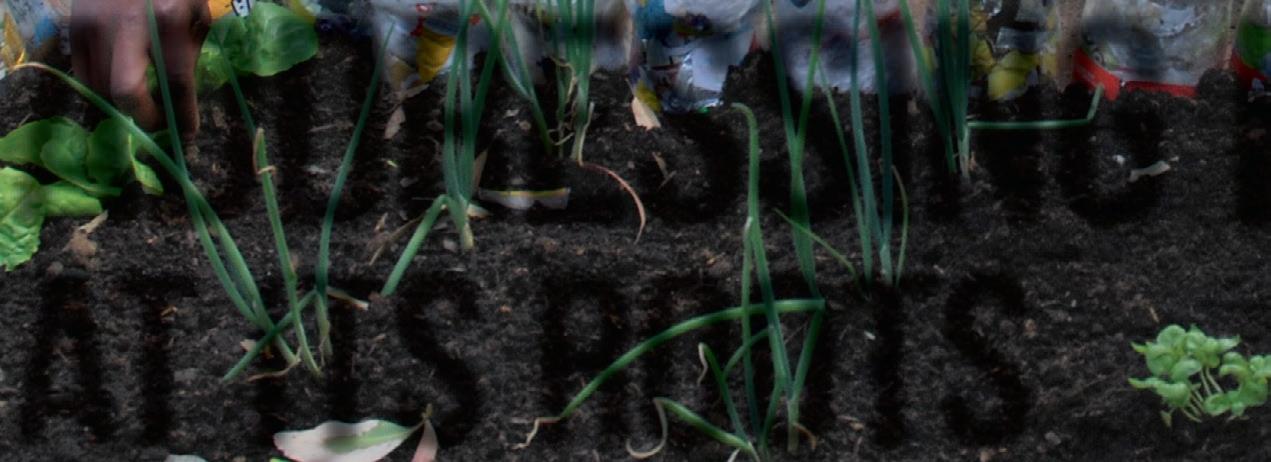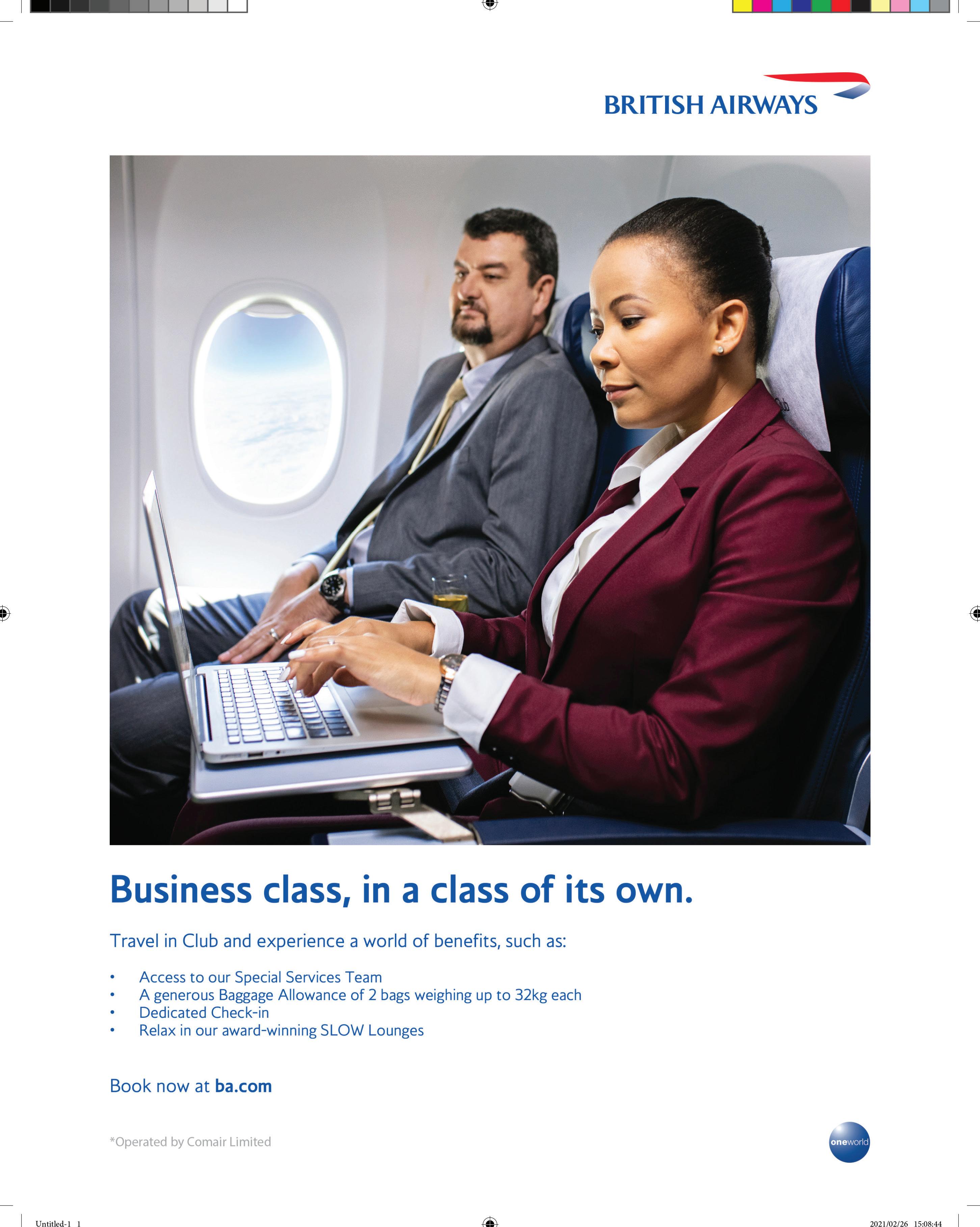
7 minute read
Food Security
Fezile Same and Ncumisa Duma at the Masi Creative Hub food garden
ADDRESSING HUNGER

AT ITS ROOTS

As more and more people lose their jobs and many more go hungry, some individuals and organisations are trying to ensure that the most vulnerable in our society are looked after. Gareth Griffi ths reports
Yandiswa Mazwana is the founder and operations manager of the Masi Creative Hub (the Hub), a nonprofi t organisation started in 2017 to provide a safe, supportive and educational environment for Masiphumelele community members to help them creatively overcome their daily challenges.
Since the beginning of the national lockdown, the Hub ran a feeding scheme for young children, which rapidly extended to all people living in dire situations of hunger and food shortages.
Yandiswa tells a heartbreaking story of poverty in its most abject form – a complete lack of basic food provision for many inhabitants of Masiphumelele.
“Most people, especially those in government, have no clue how people are suffering here. They depend on one meal for the whole day and if a kind neighbour is not able to provide, they simply go hungry. The Hub is supplying over 520 meals each day to children, old people and any adult suffering from hunger, although our emphasis has been on children,” she explains.
LACK OF OFFICIAL DOCUMENTS
Yandiswa explains that hunger has no specifi c group or origin – people in severe need come from three identifi able categories. • Those with SA identity documents or other offi cial documentation such as birth certifi cates, but who have no work and in many cases no shelter. • Those who qualify but have no SA paperwork whatsoever, and who have struggled for years to get SA Home Affairs to issue them with documents. • Non-SA citizens, many of whom are elderly and have fl ed distressed countries such as Zimbabwe to seek healthcare and fi nd refuge with relatives who are employed in
South Africa. The last two groups mentioned do not qualify for governmental social funding at all and for governmental social funding at all and rise and collect food, so where a neighbour is children who are from those families receive children who are from those families receive unable to help, the Hub delivers. no schooling. “Often, these people go and no schooling. “Often, these people go and There are some champion fi nd shelter in the (neighbouring) wetlands – fi nd shelter in the (neighbouring) wetlands – individuals, organisations and hungry and desperate,” she adds. companies that have helped the Hub by supplying basic food ingredients and supplies, including a bar of soap. Yandiswa lists several organisations and people from established communities in the Valley who rose to the challenge. “The
LOCAL COMMUNITIES OFFER HELP
Those who are bedridden due to illness,
WHAT’S ON THE MENU?
A typical food kitchen weekly lunch menu from the Masi Creative Hub:
Monday: Samp and vegetables Tuesday: Pap and soup Wednesday: Rice and vegetable stew Thursdays: Samp and vegetables again Fridays: “Ndihluthi” packs – a bag fi lled with nutritious ingredients that can feed a family of four. The packs are fi lled with donated basic provisions goods by volunteers from the established communities, a process that has continued right through the pandemic.
including COVID-19, haven’t the energy to rise and collect food, so where a neighbour is unable to help, the Hub delivers. There are some champion individuals, organisations and companies that have helped the Hub by supplying basic food ingredients and supplies, including a bar of soap. Yandiswa lists several organisations and people from established communities in the Valley who rose to the challenge. “The

help is coming from local people and business, not from government,” she adds.
The Hub prepares the food and distributes it from its kitchen within the township.
Along various perimeter walls and community public spaces, an initiative was started and run by Fezile Same of the Hub to establish and nurture food gardens for supply to the Hub’s kitchen and individuals who are in need.
Meanwhile, in neighbouring Ocean View, an initiative started by the Ocean View Mosque (OVM) caught the attention of the City of Cape Town, which cloned the model for reuse elsewhere.
Rashid Davids, a building contractor from the Ocean View community, speaks with passion about the OVM initiative, in which he has become thoroughly involved.
“Before lockdown, 80 per cent of Ocean View was already living under the breadline. From humble beginnings of a weekly feeding scheme since 2014, the Noorul Islam Mosque rose to the need of larger-scale feeding when the lockdown was implemented.”
The meals were pre-packed and distributed, using a tweaked version of the existing mapping of the zones/areas of Ocean View, by zone leaders and street champions to include as many needy people as possible.
“We soon encouraged community members to set up satellite soup kitchens and soon 40 soup kitchens arose in various areas of Ocean View. Our soup kitchens cater for all persons and religious communities,” he concludes.
CAN YOU HELP?
The food shortage within Masiphumelele township of Cape Town is serious. Several local nongovernment organisations, businesses and concerned residents of the Far South have responded even before the lockdown, but the situation has worsened due to rising unemployment and a lack of access to government support.
The Masiphumelele Creative Hub is a local nonprofi t organisation started by a concerned local, Yandiswa Mazwana. It and other food-security organisations such as CAN have been supplying meals and various other support services. They need basic food and healthcare products including soap and sanitary towels.
Contact Yandiswa on 071 358 6289 or visit www.masicreativehub.org
NO ONE SHOULD GO HUNGRY
One of the outcomes of a global pandemic is a deepened food crisis in the most vulnerable communities, reports Levi Letsoko
Dependence on community feeding programmes is rising rapidly and food security organisations are working hard to feed the poor and hungry. Although they often function with limited resources, these organisations have had to fi nd innovative ways of reaching the most vulnerable.
Sarah-Jane Brink, senior manager at Siyabonga Africa, an organisation focused on alleviating poverty through food provision and skills acquisition for the unemployed, believes that the pandemic has highlighted the important role played by hunger-fi ghting organisations.
“Amid the pandemic, a poverty-free South Africa has become seemingly further out of reach. We have not always been able to respond to every call for help – this has been diffi cult for our team,” says Brink.
“However, in many ways, our organisation has been pushed to innovate and use technology and old-fashioned grit to get the job done. We have had to adapt to the idea of working remotely and offering some services online,” she adds.
FoodForward SA’s Deidre Adams is equally concerned about how the pandemic has worsened the state of food insecurity in vulnerable communities.
Deidre Adams
INNOVATION AND PARTNERSHIPS
“Since the pandemic, we have had to rapidly scale our operations to meet the rising need for food. This included expanding our footprint to remote provinces where we have no physical branches,” explains Adams.
Siyabonga Africa has created a food voucher programme using technology to reach all parts of the country. The programme simply sends a code to the benefi ciary via SMS. The recipient then redeems the code at a local supermarket. This solution not only upholds social distancing, but also enables the organisation to continue with its mandate. FoodForward SA has created partnerships with retailers, manufactures and farmers to source surplus food, which is stored and inspected before being supplied to just over 1 000 benefi ciary organisations. However, Adams says, the organisation needs to secure more partnerships to enlarge the network.
Siyabonga Africa has successfully joined hands with numerous partners to secure food for the most vulnerable. The organisation also prioritises the pride and dignity of its benefi ciaries, employing initiatives that aim to empower them to reclaim their self-suffi ciency.
“Presently, through the food voucher programme, Siyabonga Africa is equipping people with the means to access food. It places the responsibility on the recipient to buy and cook their own food,” says Brink.
“Purchasing, packaging and delivery costs and risks are eliminated and it increases our capacity to reach people in need countrywide,” she concludes.
Siyabonga Africa
Food Forward SA





